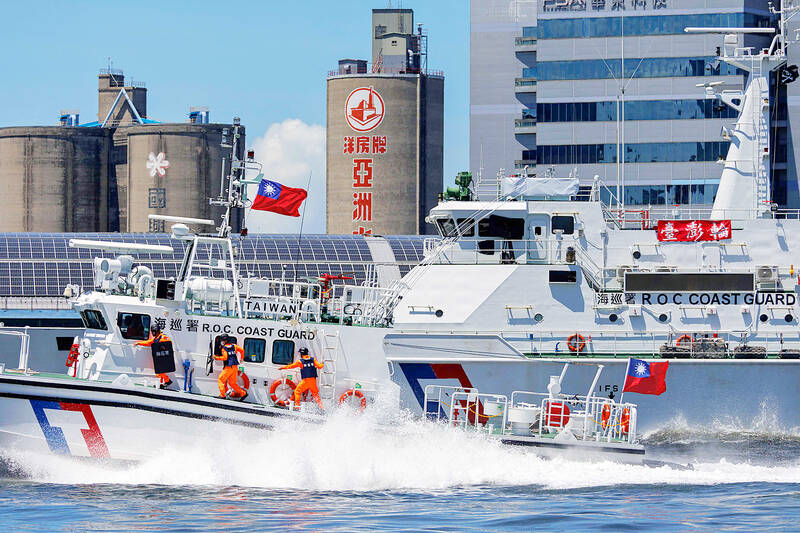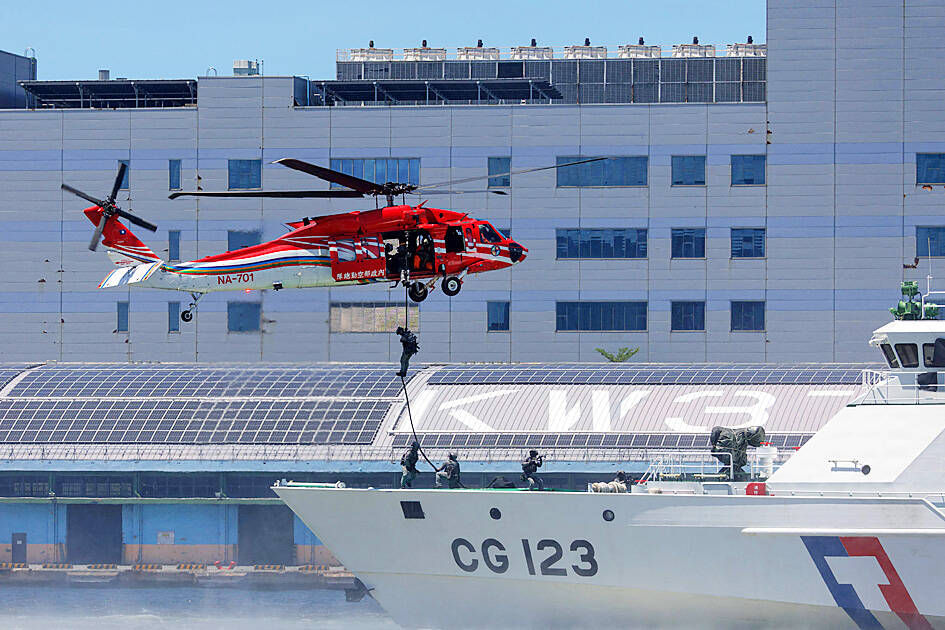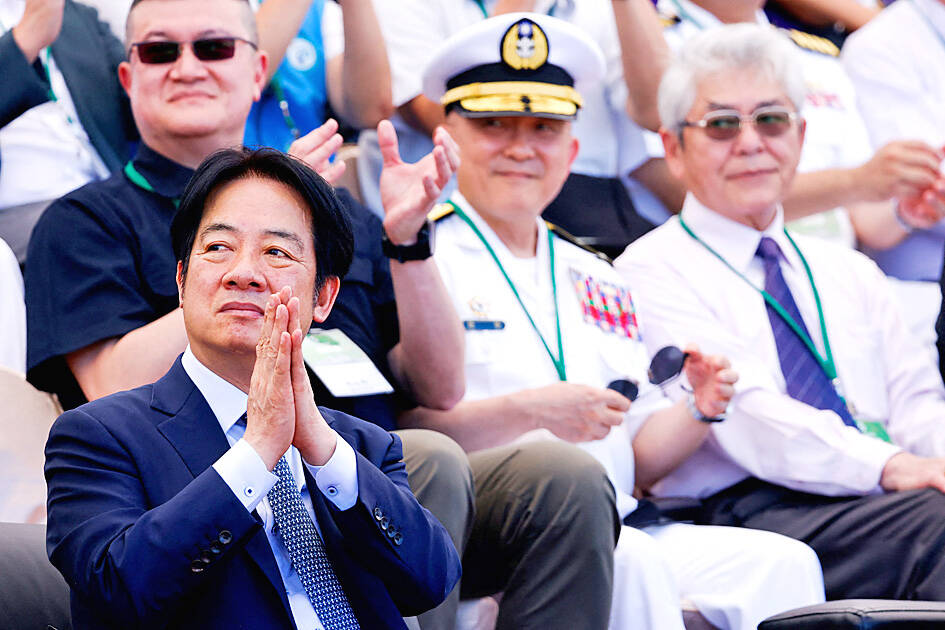President William Lai (賴清德) yesterday urged lawmakers across party lines to support the Executive Yuan’s plan to allocate a special budget of NT$410 billion (US$13.7 billion) to upgrade Coast Guard Administration (CGA) facilities in light of rising “gray zone” harassment from China.
Lai called for support for the CGA funding after watching the 12th Hai An exercise at the Port of Kaohsiung yesterday morning, which was part of events held to observe National Oceans Day.
During the exercise, the coast guard and navy jointly demonstrated their skills in maritime interception and pursuit, airlift rescue operations and a joint sea and air parade.

Photo: Yu Chen Cheng, AFP
The drill simulated the seizure of a ferry by “international terrorists,” the CGA said.
The coast guard worked with a rescue helicopter from the Ministry of the Interior and an army medevac helicopter to take control of the boat and rescue passengers.
A navy anti-submarine helicopter flew over the scene as the drill ended, along with the medevac and rescue helicopters, the first time they have flown together in such a scenario, the coast guard said.

Photo: Yu Chen Cheng, AFP
The coast guard, which would be mobilized for military duties in the event of war with China, is also routinely sent out to shadow Chinese ships during Beijing’s war games around Taiwan.
“Aside from the rapid changes in geopolitics and frequent extreme weather events, Taiwan is also facing constant ‘gray zone’ harassment from China. Still, the coast guard continues to enforce the law on the front line, cracking down on smuggling and saving lives at sea. They are dedicated to guarding the safety and security of people’s lives and property,” Lai told the audience for the drills, which included American Institute in Taiwan Kaohsiung Branch Chief Neil Gibson.
Determination itself would not be enough when facing mounting challenges in guarding the nation’s territorial waters, Lai said, adding that continual investment in maritime safety is necessary.

Photo: Ann Wang, Reuters
“The Executive Yuan has compiled a special budget plan, in which NT$410 billion would be spent building maritime vessels, procuring uncrewed aviation vehicles, installing smart surveillance devices in waters around the nation, training coast guard personnel and upgrading their gear,” Lai said.
The coast guard urgently needs infrared thermal imaging systems to enable it to have a precise assessment of the maritime environment at night, while it also needs drones and smart surveillance devices to monitor situations at sea and in the air, Lai said.
“I would like to use the opportunity to call for lawmakers across party lines to support the coast guard, as well as the special budget plan, so the coast guard can have the most advanced technology and equipment to guard our nation and protect our people,” he said.
The Chinese Nationalist Party (KMT) caucus yesterday said it supports the plan to bolster territorial defense, but added that funding for the CGA should be included in the special defense budget plan that is to be reviewed in the next legislative session.
The special budget should be used to tackle challenges brought by US tariffs, it said.
It should be used to help small and medium-sized business owners, assist workers and give money back to the public, it added.
Additional reporting by Lin Hsin-han

Right-wing political scientist Laura Fernandez on Sunday won Costa Rica’s presidential election by a landslide, after promising to crack down on rising violence linked to the cocaine trade. Fernandez’s nearest rival, economist Alvaro Ramos, conceded defeat as results showed the ruling party far exceeding the threshold of 40 percent needed to avoid a runoff. With 94 percent of polling stations counted, the political heir of outgoing Costa Rican President Rodrigo Chaves had captured 48.3 percent of the vote compared with Ramos’ 33.4 percent, the Supreme Electoral Tribunal said. As soon as the first results were announced, members of Fernandez’s Sovereign People’s Party

MORE RESPONSIBILITY: Draftees would be expected to fight alongside professional soldiers, likely requiring the transformation of some training brigades into combat units The armed forces are to start incorporating new conscripts into combined arms brigades this year to enhance combat readiness, the Executive Yuan’s latest policy report said. The new policy would affect Taiwanese men entering the military for their compulsory service, which was extended to one year under reforms by then-president Tsai Ing-wen (蔡英文) in 2022. The conscripts would be trained to operate machine guns, uncrewed aerial vehicles, anti-tank guided missile launchers and Stinger air defense systems, the report said, adding that the basic training would be lengthened to eight weeks. After basic training, conscripts would be sorted into infantry battalions that would take

GROWING AMBITIONS: The scale and tempo of the operations show that the Strait has become the core theater for China to expand its security interests, the report said Chinese military aircraft incursions around Taiwan have surged nearly 15-fold over the past five years, according to a report released yesterday by the Democratic Progressive Party’s (DPP) Department of China Affairs. Sorties in the Taiwan Strait were previously irregular, totaling 380 in 2020, but have since evolved into routine operations, the report showed. “This demonstrates that the Taiwan Strait has become both the starting point and testing ground for Beijing’s expansionist ambitions,” it said. Driven by military expansionism, China is systematically pursuing actions aimed at altering the regional “status quo,” the department said, adding that Taiwan represents the most critical link in China’s

‘REALLY PROUD’: Nvidia would not be possible without Taiwan, Huang said, adding that TSMC would be increasing its capacity by 100 percent Nvidia Corp CEO Jensen Huang (黃仁勳) on Saturday praised and lightly cajoled his major Taiwanese suppliers to produce more to help power strong demand for artificial intelligence (AI), capping a visit to the country of his birth, where he has been mobbed by adoring fans at every step. Speaking at an impromptu press conference in the rain outside a Taipei restaurant, where he had hosted suppliers for a “trillion-dollar dinner,” named after the market capitalization of those firms attending, Huang said this would be another good year for business. “TSMC needs to work very hard this year because I need a lot